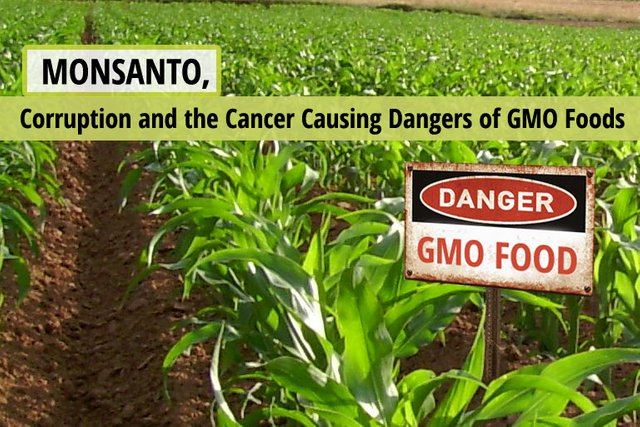Monsanto is one of world class company in agricultural industry which known widely with it's controversial products such as insecticide DDT, PCBs (which was used for paints, electrical equipment and other products), Agent Orange (defoliation of jungle vegetation, widely use in Vietnam war), and recombinant bovine growth hormone for boosting milk production (later declared unsafe by medical experts).
All of these products together with green revolution, are initially succeed to bring farms with high yield productivity and feed the world growth population. Unfortunately, the chemical use in agriculture also produce the unwanted side effects such as resistant insect and pest, and destroy the properties of the soil; forced farmers to increase the dosage yearly. It laying the ground for agricultural industry heavy reliance on pesticides and fertilisers which proven polluting environment and soil-food web. Later, it's known to cause cancer, birth defects and infertility for human.

In the 1990s, Monsanto first commercialised genetically engineered crops which resistance toward pest, insects and even drought climate, and moving forward to patented those genetic modified seeds. Though it succeed to bring profit for farmers, the foods coming from genetically modified (GM) crops have a number of potentially negative side effects. Reported by livestrong.com, those GM crops are potents to harm human and other organism that may consume it, cross contamination of nearby plants with pollen, increased resistance to pesticides, and allergenic effects may result in the introduction of allergenic material from one species into another (e.g. The introduction of genetic material from Brazil nuts into soybeans).
Another issue was Monsanto domination in market which some says coming from its "mafia tactic" business. Monsanto has actually hired an army of private investigators and agents to secretly videotape and photograph farmers that may attempt to reuse their seeds. More, Monsanto has also considered using what’s known as terminator technology on a wide-scale basis. These are sterile seeds, which means farmers must buy them again each year, and relying on Monsanto for their seed supply like forever!
Eventually, control over seed means control on the first link in the food chain, that will give you a way to control the rest of agriculture chain of production industry.
"Farmers must buy them again each year, and relying on Monsanto for their seed supply like forever!"
Monsanto in Indonesia
Monsanto has been operating in Indonesia since four decades ago, through partnership with local agriculture company. Recently, Monsanto was represent through seeds company PT. Branita Sandhini which investing $40 million in development of corn hybrid seeds and transgenic in Mojokerto, East Java province. According to Indonesian ministry of industry (MoI), this investment will put Indonesia as a basis for a "high quality" corn seeds production in South East Asia.
Genetic modified seed firstly brought in this country in Makassar, March 2001 —in form of 40 tons transgenic cotton seeds from South Africa — amid "strong protests," not by Western activists but a whole raft of local NGOs. Before it, opposition coming from high level administration, as Environment Minister Sonny Keraf able to convince coordinating economic minister Rizal Ramli to delay the signing of agreement between the government of Indonesia and this American-based company Monsanto on the development of cotton seeds in South Sulawesi. Unfortunately, the delay only works for a year.
This pilot project of transgenic cotton plantation in South Celebes province proven failed and costing a huge number of farmers. Monsanto promising the farmers with cotton yields up to 3-4 tons/ha, pest resistant, success rate at 98% and environment friendly. In addition, company also provide line of credit for seeds, fertiliser and pesticides to attract the farmers. The result? The plants are still at risk of caterpillar attack and forced the farmers to spend more money on pesticides, while the cotton yields only 998kg/ha averagely, even lower than traditional yield rate at 1-1.5 ton/ha.

Nevertheless, the rejection of opposition and even crop failure didn't cease government ambition to expand the productivity simply through GM. Instead of halting, Indonesian government is planning to permit the release Monsanto's GM corn seeds naming Roundup Ready NK 603 in to market, as reported by Sindo Weekly. Though there is a research report of Professor Gilles-Eric Seralini of the University of Caen discovered that rats fed Monsanto’s “Roundup Ready” corn developed significantly more tumors than rats not fed GM corn. In addition, rats fed a GMO diet developed aggressive tumors and died sooner than rats in the control group, reports Natural News.
As is another countries, Monsanto also known have a couple of law infringements in Indonesia. According to Tirto.id, a leading online investigation media, Monsanto have been proven to bribery some high rank official in between 1997-2012 with a total at least $700.000. These bribery are spending for illegal, unreported, and price mark-up of pesticide sales here.
Lessons from India
The entry of Monsanto in the Indian seed sector was made possible with a 1988 Seed Policy imposed by the World Bank, requiring the Government of India to deregulate the seed sector.
Since then, the price of cotton seeds has increased by almost 80,000% (from ₹5 – ₹9/KG to ₹ 1600 for 450 gms). 300,000 Indian farmers have committed suicide, trapped in vicious cycles of debt and crop failures, 84% of these suicides are attributed directly to Monsanto’s Bt cotton. See this Monsanto vs Indian Farmers!
Accusation here, Monsanto’s royalty extraction, and the high costs of seed and chemicals have created a debt trap. According to Government of India data, nearly 75 per cent rural debt is due to purchase inputs. As Monsanto’s profits grow, farmers’ debt grows.
A publication from the New York University School of Law shows that in 2009 alone, 17,638 Indian farmers committed suicide, which translates to one farmer every 30 minutes.


Additional environment problem named GMO
Downvoting a post can decrease pending rewards and make it less visible. Common reasons:
Submit
GMO is absolute threat for biodiversity, human and natural resources
Downvoting a post can decrease pending rewards and make it less visible. Common reasons:
Submit
Bakal bermunculan penyakit baru. Rekayasa genetik mengakibatkan gangguan genetik dan hormonal pada manusia
Downvoting a post can decrease pending rewards and make it less visible. Common reasons:
Submit
This post has been curated by TeamIndia (IndiaUnited), a dedicated team to support fellow Indians to write and promote quality content, please join our Discord Server . Delegate SP to @indiaunited to increase our influence. Community growth is precursor to Individual growth.
If you would like to delegate to @IndiaUnited you can do so by clicking on the following links: 25SP, 50SP, 100SP, 250SP. Be sure to leave at least 50SP undelegated on your account.
Downvoting a post can decrease pending rewards and make it less visible. Common reasons:
Submit
Thanks for writing this! I will resteem it and share it at Artists Against Monsanto...
Downvoting a post can decrease pending rewards and make it less visible. Common reasons:
Submit
Thank you so much 😊🙏🏻
Downvoting a post can decrease pending rewards and make it less visible. Common reasons:
Submit
Bg neu vote ata kamoe sigo2 😊
Downvoting a post can decrease pending rewards and make it less visible. Common reasons:
Submit
Gèt. Ka lôn vote laju padup-padup boëh. Dang ta preh meutamah Steem Power beuh ...
Downvoting a post can decrease pending rewards and make it less visible. Common reasons:
Submit
Get bg...lon mantong bljar bg hana that mngrti lom,,,droneuh di bireun daerah teh tggai bg,,,kdang wate lon woe u samalanga jeut lon singgah bak ureung droeneuh untuk lon lake2 ilmu bacut 🙏🙏😄
Downvoting a post can decrease pending rewards and make it less visible. Common reasons:
Submit
Follback bang ya.
Downvoting a post can decrease pending rewards and make it less visible. Common reasons:
Submit
Done! Thanks teman 😊
Downvoting a post can decrease pending rewards and make it less visible. Common reasons:
Submit
Siap bg.
Downvoting a post can decrease pending rewards and make it less visible. Common reasons:
Submit
Dah ku vote ya @rshahputra. Salam kenal di steemit, farah, ka vote punya aku dulu ee
Downvoting a post can decrease pending rewards and make it less visible. Common reasons:
Submit
Hahaha, get hai buk ..,
Downvoting a post can decrease pending rewards and make it less visible. Common reasons:
Submit
Keren. Tulisan pak @rshahputra selalu saya baca. Rajin2 ngepost ya bro
Downvoting a post can decrease pending rewards and make it less visible. Common reasons:
Submit
Haha, thanks bro.
Downvoting a post can decrease pending rewards and make it less visible. Common reasons:
Submit
Thank you for following me. I too follow you
Downvoting a post can decrease pending rewards and make it less visible. Common reasons:
Submit
You did? Thank you 🙏🏻
Downvoting a post can decrease pending rewards and make it less visible. Common reasons:
Submit
mantap bang 👍
Downvoting a post can decrease pending rewards and make it less visible. Common reasons:
Submit
Thanks Tia. Jangan sungkan masukan dan kritik sarannya ya.
Downvoting a post can decrease pending rewards and make it less visible. Common reasons:
Submit